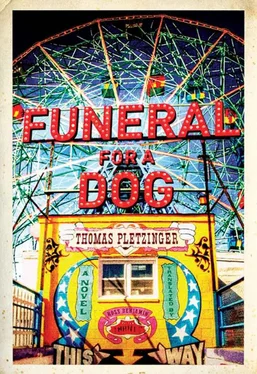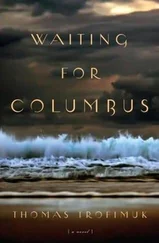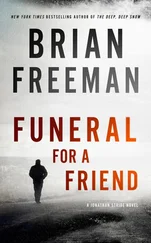There are more important things,
she says, going around me and my outstretched hand, you’re not going to get anywhere with your interview today, Karvasmanteli , just come along (she speaks slowly and clearly). Svensson jumps ashore again, and tries to help her across the pedal boats, but she too steers clear of Svensson. He holds his hands apologetically in the air. Svensson and I watch as she sits down on the deck between the dog and the boy. She talks to the boy, she seems to be explaining the dog’s three legs (Finnish is a soft language). Finally Svensson asks: You’re Mandelkern? In reply I repeat: yes, it’s very nice to meet you, we have an appointment here this afternoon, Riva Albertolli, right? Svensson looks at me silently. I’m holding the plastic bag with my notebooks, postcards, and shirts in one hand and the small woman’s suitcase in the other (in my head: Elisabeth in the bathroom; the drizzle on the chestnut trees as I ran off last night). I’m early, I say to Svensson, my baggage is still on its way, I’d be glad to wait here for you. In the sunlight between the lindens a few old men play chess, panama hats and bright summer shirts (I could join them). But Svensson shakes his head: Climb aboard and come along, he says, or stay here, it’s completely up to you, Mandelkern. You decide (memory is bulky baggage).
hairpins and the deeper water
Here in Lugano there’s no wind, the mountains on the right and left are wearing thin clouds, near the shore the lake is a translucent green, but after a few meters the bottom is already no longer visible. Svensson backs the boat between the pedal boats into the deeper water, then he shifts into forward, accelerating so suddenly that the boat rises steeply. The heavy dog loses his balance and, lying on his side, slides across the wet deck (his foreleg a frantic scratching on wood). Tuuli with the Finnish passport falls toward me, her head lies briefly on my shoulder (she clutches the boy immediately with both arms). From up close I don’t smell any trace of her cigarettes, the light hair on the nape of her neck is sticky, I think of milk. Svensson apologizes, the boat slows down. The dog struggles to his feet, the boy closes his eyes, a hairpin falls on the deck and glimmers in the puddle (for blonde women there are golden hairpins, says Elisabeth, for dark-haired women there are black ones, but for redheads there are none. My reply: girls with freckles and red hair are honored guests in the devil’s lair, followed by Elisabeth’s laughter). I pick up the hairpin, dry it off, and give it back to Tuuli. The dog is coughing again, now the boy is crying after all, one of the yellow swans soars into the air and follows the boat.
Daniel Mandelkern?
In the afternoon Elisabeth will be going for a run along the canal, singing Celentano (Isekanal). The summer of 2003 was a summer of record-breaking heat. I know where my name comes from: my parents called themselves Mandler (they had to flee anyway). Elisabeth calls orgasms milky moments. I never liked telemarketing. Ethnology is a science, it’s about the eye of a stranger on human groups. My grandfather is said to have gone bald too (on my mother’s side). It’s not up for discussion, Elisabeth said, I’m wearing red when we get married! Genealogically I’m not Jewish, but I am circumcised. Elisabeth is five years older than I, but doesn’t look it, she says: I have a great metabolism. I’m not a practicing Catholic, but I remember my first confession. To write about art is art. In Hamburg I’ve moved four times: Dithmarscher Strasse, Schulterblatt, Marthastrasse, Bismarckstrasse, and I’ve always lived with women. My father’s marriage to the youngest daughter of a member of the Quickborn Catholic youth movement in postwar Essen was problematic solely due to the age difference (he died in 1974, she in 1990). I’ve slept with twelve women. I speak German, English, a little bit of French, Swedish, Finnish, miserable Italian. To write about sports is art too. I manage as everyone manages. Elisabeth has stopped taking the pill, now she wants to have a child. I want you to decide, she says.
Why a children’s book?
Svensson steers the boat slowly and in wide curves across the smooth lake. The dog lifts his foreleg onto the railing and barks at the water’s surface (focused and dull as if something were there). Svensson puts his hand on the dog’s head. When a gray motorboat approaches, Svensson says customs, passports (Guardia di Finanza). He decelerates with a quick hand motion, the motor sputters, there’s a smell of gas (multihued streaks on the smooth water). Macumba drifts on the lake. Here is the deepest point, Svensson says to the boy, 288 meters, no light penetrates down there, down there all the fish are white. The boy slowly makes his way to the middle of the boat (can children conceive of depth?). We have our passports ready, but the man at the steering wheel sees Svensson and the black dog, he shouts something Italian, Svensson shouts back. Both give a thumbs-up. The customs boat turns away with a deep roar of its motor, Macumba rocks alarmingly.
I had a fleeting acquaintance with Elisabeth
She entered the office, ABC Market and Opinion Polls, a tight Union Jack T-shirt over a pregnant belly (short hair, a dark henna red), and for a whole autumn sat two computers down from me every day, including Sundays. Sometimes I listened to her, she was efficient. We rarely talked (I smoked on the balcony during the break, she drank tea in the kitchen), and when it got too cold to smoke on the balcony, it must have been November 1996, overnight she became my superior for the first time (supervisor). One evening after work, as I walked through the snow a few meters behind her on the way to the Hamburger Strasse U-Bahn station, she sang softly to herself, “There are some who are in darkness / And the others are in light / And you see the ones in brightness / Those in darkness drop from sight.” A few weeks later she was gone. Our colleagues assumed the child had been born. On the supermarket studies she’d been the best interviewer from the start, the manager said later in a training session, her voice had exactly the right register for market research, a frequency that sang resistance to pieces.
master of chairs, master of chickens
Svensson spreads his arms. This is where we live, he says (a children’s book author and his three-legged dog). A narrow but tall stone house surrounded by cypresses, an oleander, and a gigantic sycamore. Svensson has moored Macumba to the dock and helps us ashore one after another: first Tuuli, then the boy, then me, and finally the dog. In front of us there’s a stone table and two stone benches covered with moss and pine needles (the benches shouldered by lions), next to them garden chairs with flaking white lacquer. Stainless garden chairs, an inflatable plastic armchair (blue, not much air). Also: wicker chairs, a few wooden chairs with warped and cracked plywood seats (on two of them large stones), next to them garden lounge chairs with mildewed cushions, also bare lounge chairs. And still more: a chair made of green lacquered metal (with canvas upholstery), folding chairs made of pale red wood, a granite table with two granite benches, white plastic chairs, blue plastic chairs, pink plastic chairs, four green children’s chairs with a red children’s table. There are terra-cotta pots, intact ones and broken ones, big ones and small ones, upright ones, overturned ones, empty ones and planted ones (tomatoes, herbs, kumquats). There’s a circular saw and a stack of gray plastic pipes and rain gutters, next to them bags of cement. Behind and off to the side of the house a shed, next to the shed the garbage: a heap of black plastic bags, cardboard boxes, a boat’s mast, a printer and a computer monitor with smashed screen (a surprised mouth, toothless). On a jutting branch of the gigantic sycamore hangs a child’s wooden swing, a basketball hoop is screwed to the trunk. Under it a Ping-Pong table (I could challenge Svensson).
Читать дальше












